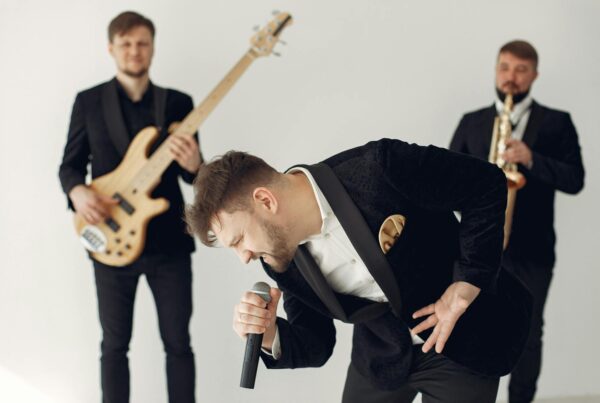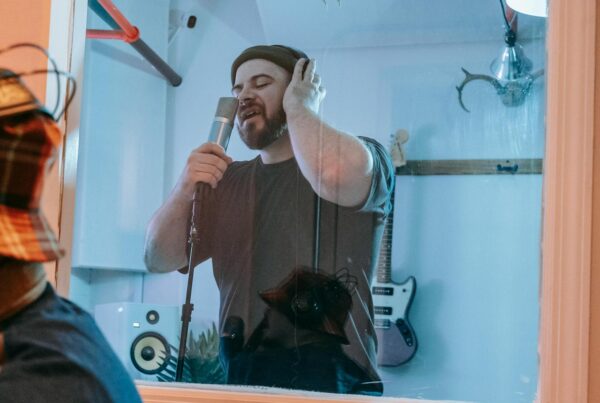Five Things You Need to Know When Choosing an Audition Song
If you’re ready to take your singing career out of the shower and onto the stage, you’re going to need an excellent audition song. To save you time, frustration and less-than-perfect auditions, here are the five things you need to know when selecting your audition song.
Did you like this episode? Then your friends and colleagues will, too!
Share this to make the world sound better, one voice at a time. Your shares also enable me to keep these resources free for you.
Ready for your best life? Find your singing solutions here.
Subscribe to Roger’s Singing Blog
[xyz-ihs snippet=”Subscribe-to-Blog-SINGING”]
- Avoid the “famous-or-unknown song” trap.
- Beware of audition song trends!
- Trim your song.
- Go big before you go home.B
- Pick the perfect song for you.
If you keep exploring and singing through lots of songs, I feel confident that you’ll find one that makes you and your voice shine every time you perform it! Don’t forget to check back and post a comment about how your audition went in the comments or tweet me @RogerLove1.
Play the Audio of this post:
TRANSCRIPT
Hi, I’m Roger Love, celebrity voice coach and top-selling author. I’m working to make the world a better place, one singing voice at a time, starting with yours.
If you’re ready to take your singing career out of the shower and onto the stage, you’re going to need an expert tips to ace your audition. We want to find a track that showcases the best of your voice in a very short amount of time and that’s not always an easy task. To save you time, frustration and less-than-perfect auditions, here are the five things you need to know when selecting your audition song.
First, pick the perfect song for you.
Before you search through your iTunes playlist or spend a week going through every song on Spotify or Apple Music, ask yourself this question: what parts of your voice feel the strongest and most comfortable? For example, is it Chest Voice? Middle Voice? Head Voice? With that answer, look for an audition song that showcases mostly those parts of your voice.
Then, sing through lots of songs until you find the right one for you. For example, if you have a really strong Chest Voice but your Middle and Head Voices are not there yet, you don’t want to pick a song that forces you to go all the way up the range into a Middle Voice that’s not great yet. In the same way, if you’re a woman with an amazing Head Voice but maybe less-than-amazing Chest Voice, singing audition blunders you should steer clear of, like don’t go for an audition song that forces you to belt Chest Voice through the whole first half!
Second, avoid the “famous-or-unknown song” trap.
Singers ask me this question all the time: Should I pick a song that everyone’s super familiar with or something most people have never heard before?
The answer is neither!
You don’t want to come in singing a song that’s really famous and associated with one particular artist. For example, if you go to a pop audition with the Céline Dion song, “My Heart Will Go On,” from the Titanic movie, the people running the audition have heard that song so many times that they’re already sick of it! So the moment you open your mouth, they’re not fully listening to you. Instead, they’re subconsciously comparing how you sing it to the way Céline sings it the entire time. Can you sing it better than Céline? Maybe. But even if you can, you don’t want that kind of competition! You want to go in and showcase the very best of your talent, not set yourself up to be compared to a superstar.
On the other end of the spectrum, let’s say you pick something completely unknown. When you go to audition, the response could be just as bad as if you’d gone with something super famous. The people listening could hear the song and start thinking, “Hmm. What’s that from?” Or, “Who sings this?” And then they might turn to each other and ask, “Do you know this song? Have you heard this before?” The whole time they’re thinking or asking these questions, they’re not listening to you!
Here’s the solution to the “famous-or-unknown song” trap.
Look for audition songs that are in between “super famous” and “super unknown.” If you’re not sure how popular or recognizable a song is, type the title into YouTube and see how many covers are already there. If that number is over ten, it might belong in the “super famous” territory. If it doesn’t show any results on YouTube, you should proceed with caution, as well.
Remember, we want the audition hosts to be looking at you, listening to you, and thinking, “You’ve got real talent!” So don’t pick a song that distracts them. Find one that makes you stand out.
Third, beware of audition song trends!
When picking your audition song, make sure it fits you, your voice, and the roles you want to get. If you’ve heard two other friends preparing a particular song for an audition, use that song with caution.
When I had my studio in New York, there was a time when every female came in singing “What I Did for Love” from A Chorus Line. After the fiftieth person I heard audition with that song, I thought, “Please! Don’t sing that unless you actually want to make every casting director in New York avoid you!” Deep down, casting directors want to be excited and entertained. Hearing the same song again and again makes them literally want to send you off stage so they can find someone who performs something fresh.
When you’re on that stage, I want you to be the person that captivates and dazzles the Casting Directors. Steering clear of current or recent audition song trends is a good way to make that possible.
Fourth, trim your song.
Selecting the right length of song is incredibly important for auditions. Once you have the right song for your voice—one that’s not too famous or totally unknown and not being sung by every other person at the audition—you’ll need to cut it down to the appropriate length.
Contrary to popular belief, shorter songs often make better audition song! For example, some auditions only want 16 bars of a song or just a verse and a chorus. The audition hosts have neither the time nor the energy to have everyone sing for five minutes so edit your song into something short, such as a verse, a chorus and a close.
If you’re singing a capella—meaning, without musical accompaniment—or making lead sheets with someone, it’s easy to edit your song. If you are using a CD or digital track for accompaniment, you’ll probably need to have someone edit it professionally or get a friend to do it in Pro Tools or Garage Band. The bottom line is, try to make your song as short and special as possible. The last thing you want is for the audition host to cut you off mid-song because your arrangement is too long.
Another benefit of singing shorter audition songs is that if you’re great, they can always ask you to sing more! After a great short audition song, I’ve had students asked to sing another full song because the audition host liked them so much. If you leave them wanting more, you win. That means you have them interested, excited and eager to give you the opportunity you’re aiming for.
You may also make multiple versions of your song—one very short, one medium length, and one longer in length—in case your preferred length is too long for a particular audition’s request and you need to use the shortened version. And that way you’ll already be prepared with the longer version if the audition host asks you to sing more for them.
Fifth, go big before you go home.
Many singers choose audition songs that end softly but small endings are not always ideal for auditions. In fact, your ending may be the strongest impression that you leave on an audition host. From this perspective, don’t choose a song that ends small, soft, and emotional. Instead, aim for big endings! As you look for songs or edit a song to use, find one that makes your voice go higher, thicker, louder, and stronger as it progresses and then boom! You’re done. And the audition hosts are excited and moved, putting your name at the top of their selection list.
Just so you know, there are people who spend their whole career trying to find the perfect audition song that showcases their best strengths and hides all of their flaws. So don’t get discouraged or be surprised when you open up iTunes and your perfect song doesn’t instantly jump out at you.
If you keep exploring and singing through lots of songs, I feel confident that you’ll find one that makes you and your voice shine every time you perform it! Don’t forget to check back and post a comment about how your audition went in the comments or tweet me @RogerLove1.




